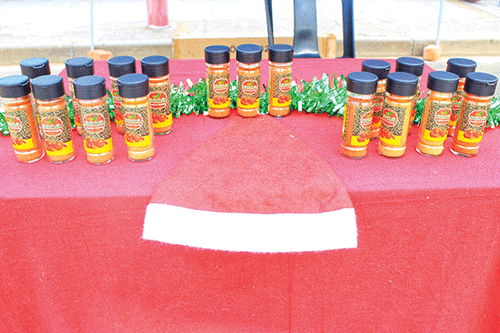Lahja Nashuuta
For a long time, Namibia has experienced missing links in the crop value chain such as value addition for fruits and vegetables and other local agricultural products.
However, it looks like the government’s call for the citizenry’s involvement in food production, with emphasis on value addition has not entirely fallen on deaf ears, as pockets of locals have now embarked on semi commercial horticultural projects, with the aim of eradicating poverty and hunger. While most of these producers opt to sell their fresh produce straight from the farm, Selma Nalusha has taken it upon herself to add value to her produce, before hitting the market.
Nalusha is the creator of Sena Tomato Powder, a tomato-based spice which she creates from dried tomatoes.
Originally from Outapi in the Omusati region, the Windhoek-based upcoming entrepreneur recently emerged as one of the top five winners of Sanlam Bridge Competition, 2023.
Sowing
Boasting an Honours Degree in Media from the University of Namibia (Unam), and pursuing a Master’s Degree in Journalism and Media Technology at the Namibia University of Science and Technology (NUST), while toiling for the same institution’s library, at glance, grinding dried tomatoes appears to be a far-fetched business option for the mother of one. But Nalusha beams with pride when she speaks of her products.
“I am in the business of producing tomato powder for daily use in food preparations. I also prolong the shelf-life of fresh tomatoes by turning them into powder,” Nalusha told New Era recently, adding that her business helps reduce food wastage while serving as a value addition alternative for the tomato market.
She revealed that her company was initially registered in 2020 at the peak of the Covid-19 pandemic, however, the tomato powder idea came to the fore in May 2023 after discovering how local vendors struggle to sell their produce, particularly tomatoes and some even perish. Also, the existing gap in the market for tomato related spices or powder was another pull factor, according to Nalusha.
“This is something that really came unexpected but from experience and research done, there was a market for a readily available tomato powder that would make food preparation and by extension life in general, easy. Imagine cutting out the hassle of chopping tomatoes to using a readymade alternative,” Nalusha said, further enthusing that her products are organically produced and sundried, which allows them to maintain the original taste of fresh tomatoes, with no preservatives or colourants added.
Currently operating from home, she lists rural and urban households, lodges, retailers, and restaurants as some of her primary target market.
Her products, she said, gives her clientele, particularly the restaurants and eateries, the edge as they are able to provide nutritional meals with the powder-based ketchup which stays fresh for extended periods as opposed to the bottled tomato sauces that go bad with time, even when refrigerated.
Reaping
She did not waste any time in revealing that the market has received her products very well and that they are practically flying off the shelves, a testament to the need that existed in the market for the initiative.
Said Nalusha: “The market really needed this product. I am always occupied with orders to the point that I sometimes bring in additional people to assist with the production and sales of the powder.”
In her own words, the small victories that she has achieved through the business spurs on to constantly build on the dream, part of which is to one day give her community more innovative, unique products that answer to their basic needs.
“My biggest achievement is being selected as the Sanlam-Namibia Bridge Competition Winner 2023. Being part of the first cohort speaks volumes and fuelled me to start this business. Also, we have a list of achievements including getting media coverage through the City of Windhoek Christmas market which brought us more customers,” Nalusha said.
Working
As is the case with many businesses, Nalusha’s venture is not spared from its share of challenges and at the moment finding a place to sell her products remains her biggest headache, even though a solution seems to be looming. In the meantime, she said, she relies on numerous social media handles for marketing and while doing free deliveries around Windhoek.
Vowing to make a mark in the fledgling food production sector, Nalusha called on other Namibians to join the fight at the forefront in this crucial industry, particularly in value addition.
“It is time for Namibians to dominate the food manufacturing industry and have more products labelled “made in Namibia”. It has been made easier with the recent launch of our very own barcode. All we need now are the manufacturing machines in the food industry to be made locally available,” Nalusha said.
“My plan is to acquire more machines and have a production place in order to increase production and recruit more youth,” she added.



